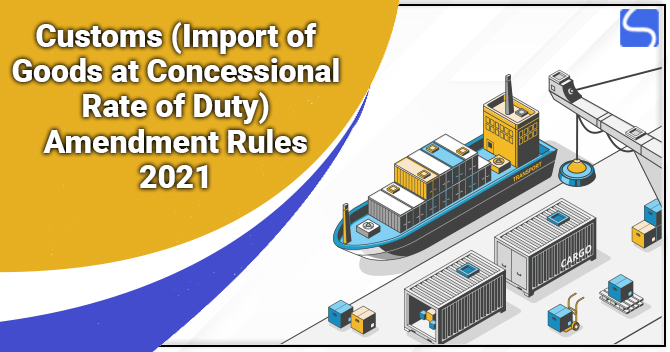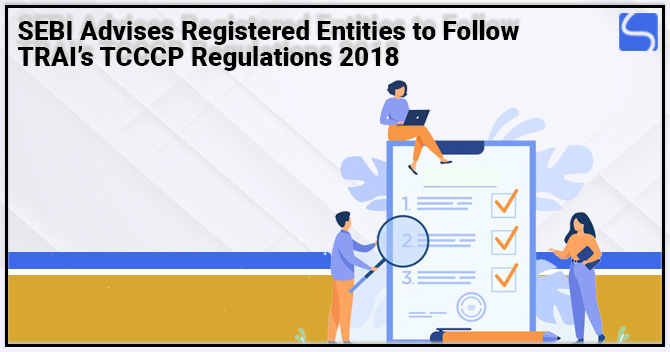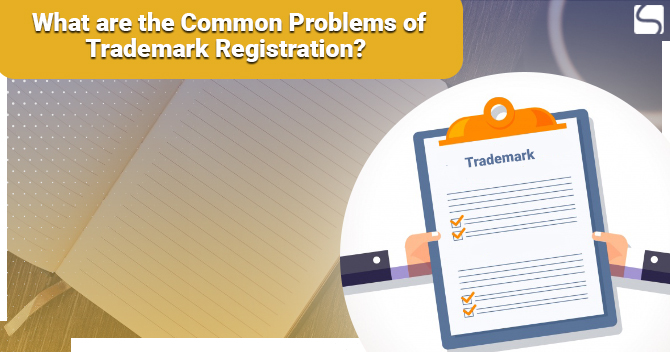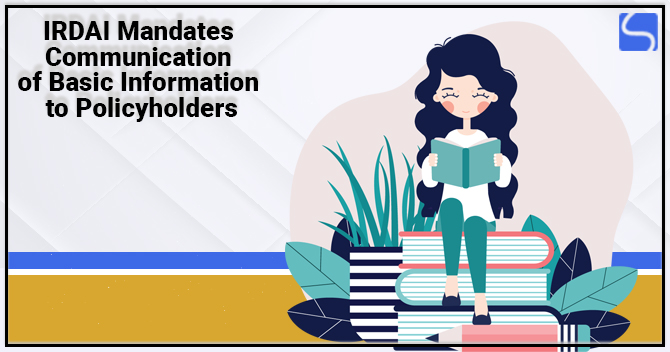Customs (Import of Goods at Concessional Rate of Duty) Amendment Rules 2021 Notified by CBIC

Shivani Jain | Updated: Feb 08, 2021 | Category: News
In furtherance to the Union Budget 2021, as announced by our Union Finance Minister, Ms Nirmala Sitharaman, the Central Government has decided to amend the provisions of the Customs (Import of Goods at Concessional Rate of Duty) Rules 2017. Further, the amended regulations will be termed as Customs (Import of Goods at Concessional Rate of Duty) Amendment Rules 2021, and had been enforced from 02.02.2021.
For amending the regulations, government has exercise the powers provided by way of section 156 of the Customs Act 1962.
In this blog, we will discuss in the detail the amendments and changes made by CBIC in Customs (Import of Goods at Concessional Rate of Duty) Amendment Rules 2021.
Table of Contents
Key Provisions of Customs (Import of Goods at Concessional Rate of Duty) Amendment Rules 2021
The key provisions of Customs (Import of Goods at Concessional Rate of Duty) Amendment Rules 2021 are as follows:
Insertion of Clause (aa) in Rule 3
The newly inserted clause (aa) deals with Capital Goods. It means those goods whose value has been capitalised in the importer’s books of account.
Insertion of Clause (ca) in Rule 3
The newly inserted clause (aa) deals with Job Work. It means treatment, process, or manufacture that is consistent with the exemption notification accepted by a person on the goods belonging to the importer, except in the case of gold, jewellery, and articles thereof, and other precious metals, or stones.
Also, Read: Customs Tarrif Amendment Rules 2021 by CBIC
Substitution of Clause (e) in Rule 3
Based on the newly passed regulations, the definition of the term Manufacture, provided under clause (e) in Rule 3 will be substituted with a new one.
Further, as per the new definition, the term manufacture means the processing of raw materials or the inputs by an importer in any manner, which results in the emergence of a new product, which have a distinct nature, or character, or use, or name.
Substitution of Clause (f) in Rule 3
Based on the newly passed regulations, the definition of the term Output Service, provided under clause (f) in Rule 3 will be substituted with a new one.
Further, as per the new definition, the term Output Service means the supply of service, excluding the after sales service and utilizing imported goods.
Substitution of Rule 4
Based on the newly passed regulations, the provision of Rule 4 are substituted with a new one. Further, the Rule 4 of Customs (Import of Goods at Concessional Rate of Duty) Amendment Rules 2021 deals with the duty of the importer to give prior information.
Under this rule, it is the duty of the Importer to furnish information and details concerning whether the imports goods will be put to use for manufacture or for rendering output service. Such an information and detail will be furnished to Deputy Commissioner of Customs and Assistant Commissioner of Customs, who is having jurisdiction over the premises. Further, the term details will include the particulars as follows:
- Name and Address of the Importer and Job Worker,, if in case any;
- The goods produced or any process undertaken at the Manufacturing premises of the Importer or his Job worker, if in case any, or both;
- The description and nature of the goods imported and used in Manufacturer premises;
- The nature of the rendered output services by utilising imported goods;
Substitution of Rule 6
Based on the newly passed regulations, the provision of Rule 6 are substituted with a new one. Further, the Rule 6 of Customs (Import of Goods at Concessional Rate of Duty) Amendment Rules 2021 deals with the duty of the importer to furnish details of the imported goods and maintain records accordingly.
The importer needs furnish such details within 2 days of to use for manufacture of goods or for job work or for rendering output service to the Jurisdictional Customs Officer.
Further, it is necessary for the importer to maintain an account and clearly specify the details concerning the goods imported as follows:
- Quantity and Value of the Goods Imported;
- Quantity of Imported Goods Consumed;
- Quantity of Goods sent for Job Work, together with the nature of work carried out;
- Quantity of Goods received after Job Work;
- Quantity of Goods re-exported, if in case any, under Rule 7;
- Quantity of remaining stock, based on Bill of Entry;
Such an information and detail will be furnished to Deputy Commissioner of Customs and Assistant Commissioner of Customs, who is having jurisdiction over the premises.
Also, it shall be compulsory for the importer to submit a quarterly return regarding the goods, which are put to use for manufacturing goods or for rendering output service, by the tenth of the following quarter.
Insertion of Rule 6A
Based on the newly passed regulations, after Rule 6, a new Rule named 6A has now been inserted. This rule specifies the procedure to be followed for allowing Imported Goods for Job Work.
Insertion of Sub Rule (3) in Rule 7
Based on the newly passed regulations, after Sub Rule (2) of Rule 7, a new sub rule named (3) has been inserted. This particular sub rule deals with the duty of the importer to put the imported goods in use after taking permission either from the Deputy Commissioner of Customs or Assistant Commissioner of Customs, who is having jurisdiction over the premises.
Further, this sub rule provides the rates of depreciation to be used in the Straight Line method. Such rates are as follows:
- 4% for every quarter in the first financial year;
- 3% for every quarter in the second financial year;
- 3% for every quarter in the third financial year;
- 2.5% for every quarter in the fourth and fifth financial year;
- 2% for every quarter thereafter;
Insertion of Sub Rule (2) in Rule 8
Based on the newly passed regulations, a new sub rule (2) has been inserted in Rule 8. Further, this sub rules imposes an obligation on the importer to use the imported goods in consonance to the conditions and stipulation provided in the Exemption Notification.
Insertion of Rule 8A
Based on the newly passed regulations, after Rule 8, a new Rule named 8A has now been inserted. This rule specifies the penalty clause and states that any importer or job worker who violates any of the provisions mentioned under the said regulations, then, in that case, he/ she will be held liable for a penalty prescribed under the provisions of section 158 (2) (ii) of the Act and without any prejudice to the rules made thereunder.
Conclusion
In a nutshell, the said amendment was made in pursuance to the announcements made by our Union Finance Minister, Ms Nirmala Sitharaman in the Budget Speech of 2021.
Further, the said amended regulations will be known as of Customs (Import of Goods at Concessional Rate of Duty) Amendment Rules 2021 and had come into force from 02.02.2021.
Lastly, in case of any doubt or complexity, reach out to Swarit Advisors, our experts are there to cater to and solve out all your financial and legal issues.
Customs-Amendments-2021-Rules-by-CBICAlso, Read: Union Budget 2021: Key Highlights of the First Digital Budget














